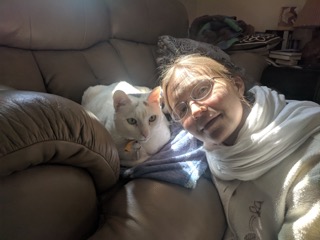Author's note:
The lyric essay, a developing hybrid form of writing, incorporates aspects of poetry and prose. Since this essay-poem focuses on language rather than on a storyline and dwells in theological mystery, the form seems to lend itself well to the content.
- Hebrew: pardes, orchard.
Hebrew: gan, garden.
Old Iranian: paridayda, walled enclosure.
Greek: parideisos, park for animals.
Arabic: firdaws, paradise, referring to the Garden of Eden.
At dusk, I sit on my friend's villa porch in Alexandria, Egypt. In front of me, two small pools glimmer in the porch light. Behind them, two bushes of yellow Angel Trumpets stand guard. Across the yard, I hear the security dogs moving and rustling in their enclosure. After I go inside, the dogs will roam the yard freely.
My friend Rachida inherited this villa from her parents. She also inherited the live-in gardener. He waters and tends Rachida's many plants: tomatoes, two types of hibiscus flowers, a banana tree, a lemon tree, a peach tree, and the yellow and pink flowers that grow up the side of the garden wall. The small flowers are so numerous that they create a thick tapestry.
I have heard that an ancient conception of paradise was a walled garden. Now I have seen it.
- Among banana trees with fruits piled one above another, in shade long-extended, by water flowing constantly, and in fruit plenty, whose season is not limited, and their supply will not be cut off.
—Qur'an 56:29-33
Fifteen years earlier, Rachida sat with me on a sofa in a darkened dormitory living room in Pittsburgh. She was a Fulbright Scholar at my college for the academic year, and I was her student in the Introduction to Islam course. We had just learned that a student in the class had committed suicide. We were both in shock.
We wondered about the student's eternal destiny, but then left it to God to judge fairly. Rachida said, "When the Qur'an was written, it describes Paradise as a well-watered garden. Of course, a well-watered place would have been paradise. Everyone lived in the desert."
In class, we discussed terrorism a lot. Someone asked about the 72 virgins that were promised to the September 11th hijackers in paradise. "Oh, the 70 virgins," Rachida said impatiently and with some irritation. "Hijackers don't get them here, and they won't get them there, either."
Although anecdotal, I read a theory of a possible mistranslation of the Arabic word for virgins. Instead, hijackers entering paradise would receive 72 raisins.
- And Jesus said unto him, Verily I say unto thee, today shalt thou be with me in paradise.
—Luke 23:43
As Jesus hung on the cross, a thief next to him said, "Remember me when you come into your kingdom." We often read this as an expression of repentance, in comparison to the angry thief on the other side of Jesus. But some scholars think the thief was asking to be remembered when Jesus inaugurated his messianic rule on earth. In fact, the thief might have been asking to be raised from the dead in order to be part of this kingdom. When Jesus said, "Truly, today you will be with me in paradise," he emphasized that the kingdom was a heavenly one.
What did Jesus mean by paradise? Did he mean an eternally well-watered garden, behind walls, in the middle of the desert?
Is God's villa very large, outside the heavenly Jerusalem? (Does God need a break from the city?) Did Jesus and the thief drink tea together, listening to chirping parakeets, away from the gaze of . . . whom? The 72 virgins? The gardener? God Almighty?
- I adjure you, O maidens of Jerusalem! If you meet my beloved, tell him this: that I am faint with love.
—Song of Songs 5:8
A twining garden vine, full of ripe grapes. We can smell them. We hear a voice and push aside the leaves to peek through, and there, a glimpse: We have seen the Lord! We reach out to touch, to grasp—and poof, he disappears.
The Kingdom of God is like unto the unraveling of a sensuous knot, one whose body slips away.
Come closer. Keep watching and waiting, he says. But touch me not.
Friends, we might be peeking through the same vine, the same wall, just at different sides, seeking the Lover.
- Paradise is the fulfillment of our deepest desires.
—Rachida
It was a red-eye flight from Istanbul to Alexandria. As the plane flew over Alexandria, lights below outlined the old port. Tears welled up in my eyes. I recognized the port by photographs I had seen in books. I had waited for this moment for 15 years. I had promised Rachida that I would visit her in Egypt, and now I was here.
At three in the morning, I recognized my former professor, waving to me in the airport's parking lot. We embraced. "You have not changed one centimeter," she exclaimed.
Rachida took me to her home and ushered me to the guest bedroom. She shut the kitchen door, so that the noise of the refrigerators would not keep me awake. On the dining room table were ripening peaches from her garden, under a mesh cover, waiting to be eaten.
If this is paradise, I will love, and I will love again.
